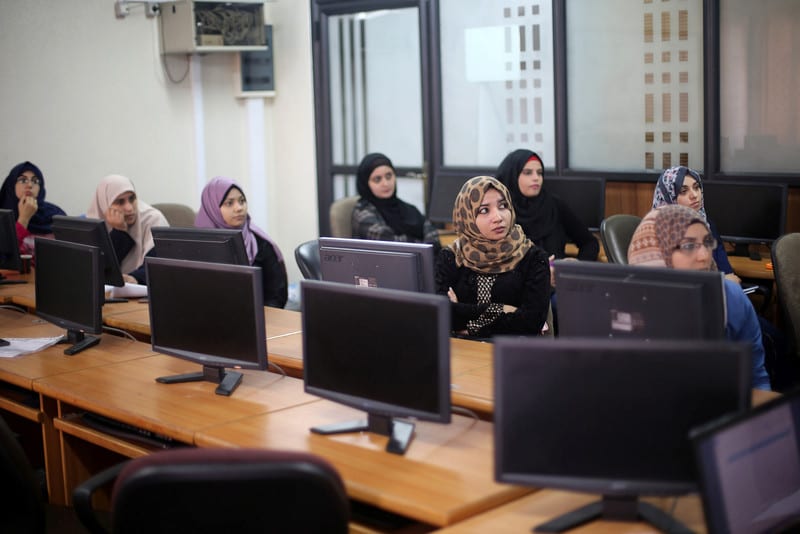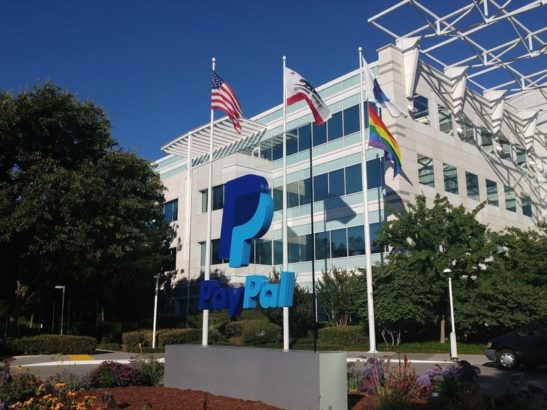PayPal claims that it is “giving opportunity to people across the globe,” but why are Palestinians and their supporters being left out? (Wikimedia Commons)
The PayPal account used by donors to contribute to Association France Palestine Solidarité – one of 20 orgs banned from Israel – has been abruptly shut down with no explanation. This happens amid an ongoing campaign by Israel to pressure other Silicon Valley companies, including Facebook, Twitter and Google to censor Palestinians and their supporters.
Benjamin Weinthal takes credit for the stoppage, apparently by suggesting to PayPal that AFPS was breaking French law by supporting the nonviolent BDS movement.
Meanwhile, PayPal denies its service to Palestinians – though not Israeli settlers – in the occupied West Bank and Gaza Strip.
See two articles below:
PayPal freezes out Palestine activists in France
by Ali Abunimah, The Electronic Intifada
PayPal, already facing pressure for its refusal to provide services to Palestinians living under Israeli military occupation, appears to be going a step further in its anti-Palestinian efforts.
Last week it abruptly shut down the account of a major Palestine solidarity group in France without providing an explanation.
In taking this action, the global payment and money transfer firm appears to be caving in to pressure from Israel and its lobby groups.
Association France Palestine Solidarité said in a statement on Saturday that it had just been informed of the “unexpected blocking” of its PayPal account, adding that several pro-Israeli websites had been crowing about the news.
AFPS said that on 26 January it received “a very succinct email from PayPal informing us of the closure of our account ‘because of the nature of our activities.’”
According to AFPS, this action came “without giving a reason and without contractually stipulated notice, despite the fact that our activities have been identical for years and we have never had a problem with our account.”
Notably, AFPS is one of 20 human rights organizations placed on a blacklist by Israeli authorities earlier this month, barring its members from entering any Israeli-controlled territory.
The group says it is demanding an explanation from PayPal and could take legal action.
Israel lobby operation
The closing of the French group’s PayPal account does appear to be a continuation of Israel’s efforts to crack down on supporters of Palestinian rights.
As intense propaganda efforts have failed to stem the growth of support for Palestinian rights in Europe and around the world, Israel has turned increasingly to censorship, repression and lawfare.
Notably, Gerald Steinberg, the head of the right-wing Israeli group NGO Monitor that harasses and smears human rights and activist groups, boasted on Twitter that his organization’s “research” about AFPS was cited in a Jerusalem Post article celebrating the shutdown of the PayPal account.
.@BenWeinthal (citing @ngomonitor research) https://t.co/Qazawaq4uo
— Prof Gerald M Steinberg (@GeraldNGOM) January 27, 2018
The Jerusalem Post article is written by Benjamin Weinthal, nominally a journalist, but in reality a key operative of Israel’s anti-Palestinian campaign in Europe.
Weinthal specializes in smearing activists and groups and in 2010 teamed up with NGO Monitor to make false allegations against The Electronic Intifada.
Weinthal is also a “senior fellow” at the Foundation for the Defense of Democracies, an American neoconservative group that has attempted to smear the grassroots, nonviolent boycott, divestment and sanctions (BDS) movement as linked to Hamas and Iran.
“Due to customer confidentiality, we cannot comment on the details of any specific PayPal account,” Weinthal reported the company telling him in response to an inquiry.
“However, we would like to stress that PayPal has zero tolerance for the use of our secure payments platform to facilitate illegal activities,” the company added.
In his article, Weinthal claims credit for approaching PayPal, suggesting to it that AFPS was breaking French law by supporting the nonviolent BDS movement.
He also takes credit for similar pressure which he claims resulted in the shut down of the accounts of other Palestine solidarity groups in 2016.
Pressure on Silicon Valley
The focus on PayPal comes amid a concerted campaign by Israel to pressure other Silicon Valley companies including Facebook, Twitter and Google to censor Palestinians and their supporters on its behalf.
Facebook has admitted that it deletes accounts at the direction of the US and Israeli governments.
Isolating Palestinians
PayPal’s corporate propaganda claims that it is “giving opportunity to people across the globe.”
But the company is already the focus of an ongoing activist campaign over its refusal to provide services to Palestinians in the occupied West Bank and Gaza Strip.
The platform has become perhaps the most common way for people around the world to carry out direct transactions with each other easily and with much less cost and complication than traditional bank or money transfer services.
Until there are widely accepted alternatives to PayPal, the company’s refusal to serve Palestinians living under military occupation and siege leaves them even more isolated.
Last year, Dalia Shurrab, an entrepreneur in Gaza, told The Electronic Intifada about the damage done by PayPal’s discrimination against Palestinians.
“PayPal’s restrictions majorly disadvantage Palestinian startup and tech companies,” Shurrab said, “essentially rigging the game in favor of their competitors in the rest of the Middle East and North Africa.”
Shurrab said that entrepreneurship in Gaza is growing fast, but PayPal’s global dominance in relatively inexpensive person-to-person payments acts as a real brake given its refusal to serve Palestinians.
Shurrab had wanted to launch her own startup, but was forced to abandon the plan given lack of access to payment. “Because PayPal does not operate in Gaza,” Shurrab said, she rarely receives payment for her freelance work.
PayPal also owns the fast growing US-only person-to-person payment service Venmo.
Undeterred
Association France Palestine Solidarité said its ability to accept donations has not been affected by the closure of its PayPal account, as it had already decided to switch its processing of donations to a different company.
Moreover, AFPS says that the attacks by the Israel lobby are an unintended tribute to the work it is doing.
The group said: “In spite of the enormous means deployed in order to gag us, we are confident that we will be able to count on the political and financial support of all who refuse to accept violations of the law as a rule of conduct in order to crush the Palestinian people.”

Why does PayPal discriminate against Palestinians?
Jesse Rubin, The Electronic Intifada, May 30 2017
Dalia Shurrab, a content writer and translator based in Gaza, receives payment for her work through online money transfer platforms, like many freelancers around the world.
But she can’t use PayPal. Despite serving nearly 200 million users in 203 countries, PayPal denies its service to Palestinians – though not Israeli settlers – in the occupied West Bank and Gaza Strip.
“PayPal’s restrictions majorly disadvantage Palestinian startup and tech companies,” Shurrab told The Electronic Intifada, “essentially rigging the game in favor of their competitors in the rest of the Middle East and North Africa.”
The company cites regulatory concerns as the reason it denies service to Palestinians, although this ignores an established working relationship between the US Treasury and the Palestine Monetary Authority.
It also works in jurisdictions far less stable than Palestine, including Somalia and Yemen.
PayPal’s policy involves discrimination. Israelis living in settlements in the West Bank can use PayPal, while Palestinians are unable to. All of Israel’s settlements are illegal under international law.
The company did not respond to The Electronic Intifada’s repeated requests for comment.
Shurrab, who lives in Beit Hanoun in the northern Gaza Strip, is – like Gaza’s two million other residents – subject to Israel’s 10-year blockade of the territory. This makes it almost impossible for her to leave Gaza through any Israeli-controlled checkpoint.
With draconian restrictions on freedom of movement and the import and export of goods and basic materials, Gaza’s economy has tanked, leaving the coastal strip on the brink of collapse.
According to the World Bank, Gaza’s general unemployment rate was 42 percent in 2016 and soared to 58 percent among youth.
To Shurrab, this stark reality also presents an opportunity.
“Entrepreneurship in the Gaza Strip, and generally in Palestine, is growing so fast,” Shurrab said. “It’s opening closed doors for these youth to find new experiences and to live their passion and make their dreams come true and be their own bosses without contributions from other governments or the private sector.”
Shurrab got her first break at Gaza Sky Geeks, an incubator for startups, tech innovation and education.
Half of the startup founders supported by Gaza Sky Geeks are female, a proportion the company aims to increase to 80 percent.
Shurrab considered one day launching her own startup, but was forced to abandon the plan given lack of access to payment.
“Because PayPal does not operate in Gaza,” Shurrab said, she rarely receives payment for her freelance work.
Heavy international anti-terrorism and anti-money laundering restrictions imposed on Hamas-governed Gaza make regular bank-to-bank transfers expensive and cumbersome, as they are subject to monitoring by Israel and the United States.
Other money transfer platforms such as Western Union or MasterCard’s Payoneer are accessible to Gazans, but high transaction fees discourage their use.
Despondent
Despite the surge of Gaza’s startup industry, PayPal’s refusal of service inhibits the potential of so many like Shurrab. The freelancer, once chosen to represent Palestine at the sixth annual Global Entrepreneurship Summit in Kenya, told The Electronic Intifada that she is despondent.
“Unfortunately, my business has stopped.”
Since 2015, Palestinian business representatives have insisted that PayPal provide services to the West Bank and Gaza.
Americans for a Vibrant Palestinian Economy, an organization that advocates for investment in Palestine, penned a letter in August 2016 to PayPal CEO Dan Schulman urging the company to extend its services to Palestinians, thereby “removing a major limitation on the Palestinian technology sector.”
It noted that tech is “one of the only sectors with the potential to grow under status quo conditions of the Israeli occupation.”
The letter was signed by 43 Palestinian companies, primarily from the startup and tech field.
Today, Gaza Sky Geeks manages 27 startups, although the total number of Gaza-based tech companies is presumably higher.
Fadi Saba, a California-based organizer of the PayPal for Palestine campaign, likened PayPal’s refusal to onerous Israeli restrictions on the Palestinian economy.
Palestinians need permission from countless Israeli authorities just to transport produce a few miles, a lengthy customs procedure that has caused exports to spoil.
“The lack of PayPal access to Palestinians is similar to the tactic of stopping Palestinian produce exports,” Saba told The Electronic Intifada, “or [like] those physical checkpoints.”
The United Nations has warned that by 2020, Gaza will be uninhabitable should the Israeli blockade continue.
“You will be tested”
In response to a query by The Electronic Intifada, Tura Winery – located in an Israeli settlement near the West Bank city of Nablus – confirmed that it accepts payment for its olive oil through PayPal.
In January 2016, Human Rights Watch warned companies that doing any business in or with Israeli settlements would “unavoidably contribute to Israeli policies that dispossess and harshly discriminate against Palestinians, while profiting from Israel’s theft of Palestinian land and other resources.”
“If [PayPal is] going to be in the same physical area they should make the service available to all people,” Granate Sosnoff, a Jewish Voice for Peace representative told The Electronic Intifada.
Dan Schulman, CEO of PayPal, is officially committed to “corporate social responsibility.”
But the language of corporate social responsibility has become so widespread that it can often read as unintentional parody.
A 2016 article by Schulman for Time magazine is a good example.
Schulman wrote that the “questions ‘why do we exist as a company?’ and ‘how do we make a difference?’ need to have the same answer.”
A company will need to turn a challenge into an opportunity: “The opportunity to prove to the world that your values aren’t just something written on a wall – that your mission is not opportunistic – it is the North Star. You will be tested.”
“This is a company that very much wants to be seen as supporting human rights,” Seth Leibson, a spokesperson for the South Bay chapter of Jewish Voice for Peace, told The Electronic Intifada, but “they’re clearly failing to do so” in Palestine.
While exact numbers are difficult to ascertain, the number of Gazan freelancers increased from mere tens in 2014 to hundreds by 2015, according to Taysir Shaqalaih from Mercy Corps, a US organization and main backer of Gaza Sky Geeks.
The rapid growth of the Palestinian IT freelance sector has further empowered the campaign demanding an end to PayPal’s discrimination.
Since the initial 2015 meeting between Palestinian businesses and PayPal, a coalition of local and national Palestine solidarity organizations has taken up the issue.
In 2016, the South Bay Palestine Organizing Coalition, the US Campaign for Palestinian Rights, Jewish Voice for Peace and others began an online petition to “Tell PayPal to end its discrimination against Palestinians.”
In November, the coalition launched a social media campaign but the company still refused to make any specific comments.
Finally, two PayPal representatives – Richard Nash and Justin Higgs – agreed to meet activists at the company’s San Jose headquarters earlier this month.
The meeting proved unsuccessful.
Corporate apathy
According to Noam Perry, a campaigner who attended, the PayPal representatives acknowledged that the situation had become a concern and that they have a moral obligation to fight discrimination.
“However, they admitted that they have not made any meaningful progress on this issue, and declined to make any commitments, even remote ones,” Perry, who works for the American Friends Service Committee and is a member of Jewish Voice for Peace, told The Electronic Intifada.
On 16 May dozens of activists held a rally outside the company’s San Jose headquarters.
They delivered 15 boxes representing more than 180,000 petition signatures collected online.
PayPal’s Higgs engaged with the protesters outside his office.
“It is a complex issue from a compliance and regulatory standpoint,” Higgs told activists. “But that’s not to say that we’re not serious about our business and democratizing financial services for the people all around the world, not just Palestine.”
Although he accepted the petition on behalf of PayPal, Higgs gave no commitments about when the company would take specific steps to change its policy. Organizers vowed to keep up the pressure, including more protests, until their demands are met.
Meanwhile, the US Campaign for Palestinian Rights attempted to deliver the petition to PayPal’s Washington, DC, office but were turned away.
Despite the obstacles that Gaza and West Bank entrepreneurs face, “the tech folks in San Jose are just like those in Palestine,” campaigner Fadi Saba said.
“They want to depend on themselves, they want to be self-sufficient – they want a fishing pole to catch their own fish.”
Jesse Rubin is a freelance reporter and regular contributor to The Indypendent, a New York-based publication. Twitter: @JesseJDRubin.
RELATED:





